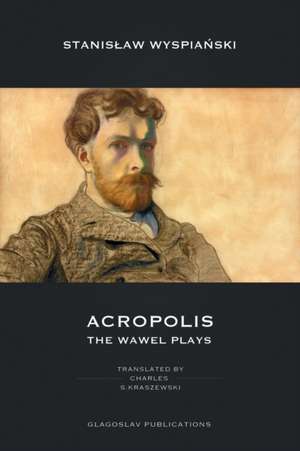Acropolis
Autor Stanis¿aw Wyspia¿skien Limba Engleză Paperback – 7 sep 2017
| Toate formatele și edițiile | Preț | Express |
|---|---|---|
| Paperback (1) | 237.17 lei 3-5 săpt. | |
| GLAGOSLAV PUBLICATIONS B.V. – 7 sep 2017 | 237.17 lei 3-5 săpt. | |
| Hardback (1) | 267.18 lei 3-5 săpt. | |
| GLAGOSLAV PUBLICATIONS B.V. – 8 sep 2017 | 267.18 lei 3-5 săpt. |
Preț: 237.17 lei
Nou
Puncte Express: 356
Preț estimativ în valută:
45.39€ • 47.44$ • 38.35£
45.39€ • 47.44$ • 38.35£
Carte disponibilă
Livrare economică 13-27 februarie
Preluare comenzi: 021 569.72.76
Specificații
ISBN-13: 9781911414544
ISBN-10: 1911414542
Pagini: 512
Dimensiuni: 152 x 229 x 30 mm
Greutate: 0.82 kg
Editura: GLAGOSLAV PUBLICATIONS B.V.
ISBN-10: 1911414542
Pagini: 512
Dimensiuni: 152 x 229 x 30 mm
Greutate: 0.82 kg
Editura: GLAGOSLAV PUBLICATIONS B.V.
Notă biografică
Stanis¿aw Wyspiäski (1869-1907) is a poet, dramatist, theatrical director, painter, architectural restorer, furniture designer, and can be called a Renaissance man of the early XX century. Wyspiäski is of prime importance to the history of Polish art, as he is to the history of Polish literature. He is the key artist of Modernism in Poland, and the driving force behind the M¿oda Polska (Young Poland) period in letters. A student of Jan Matejko, he was a professor at the Academy of Fine Arts in his home city of Kraków. During a period of study in Paris, he came to know, and be influenced by, Gaugin. His artworks are characterised by their decorative qualities and bright colours. He was especially fond of pastels. Many of his works may be seen in Kraków today. Of special importance are his stained glass windows in the Franciscan church. His designs for stained glass windows at Wawel Cathedral, including depictions of St. Stanis¿aw, remained unrealised until the XXI century (when they were incorporated into the Wyspiäski Pavilion on Grodzka St.) He is the author of nearly twenty verse dramas, chief among which is Wesele (The Wedding Feast, 1901), a poetic allegory concerning his contemporary Poland and the inability of his countrymen to act, in a concerted fashion, to win their independence from the partitioning empires of Austria, Russia and Prussia. His collected writings fill fourteen volumes. They include, besides his dramatic works, lyrical and narrative poetry, a strongly-interpreted translation of Corneille's Le Cid, the first great production of Adam Mickiewicz's Dziady (Forefathers' Eve), and a critical consideration of Shakespeare's Hamlet from the perspective of its stage realisation in modern Poland.
